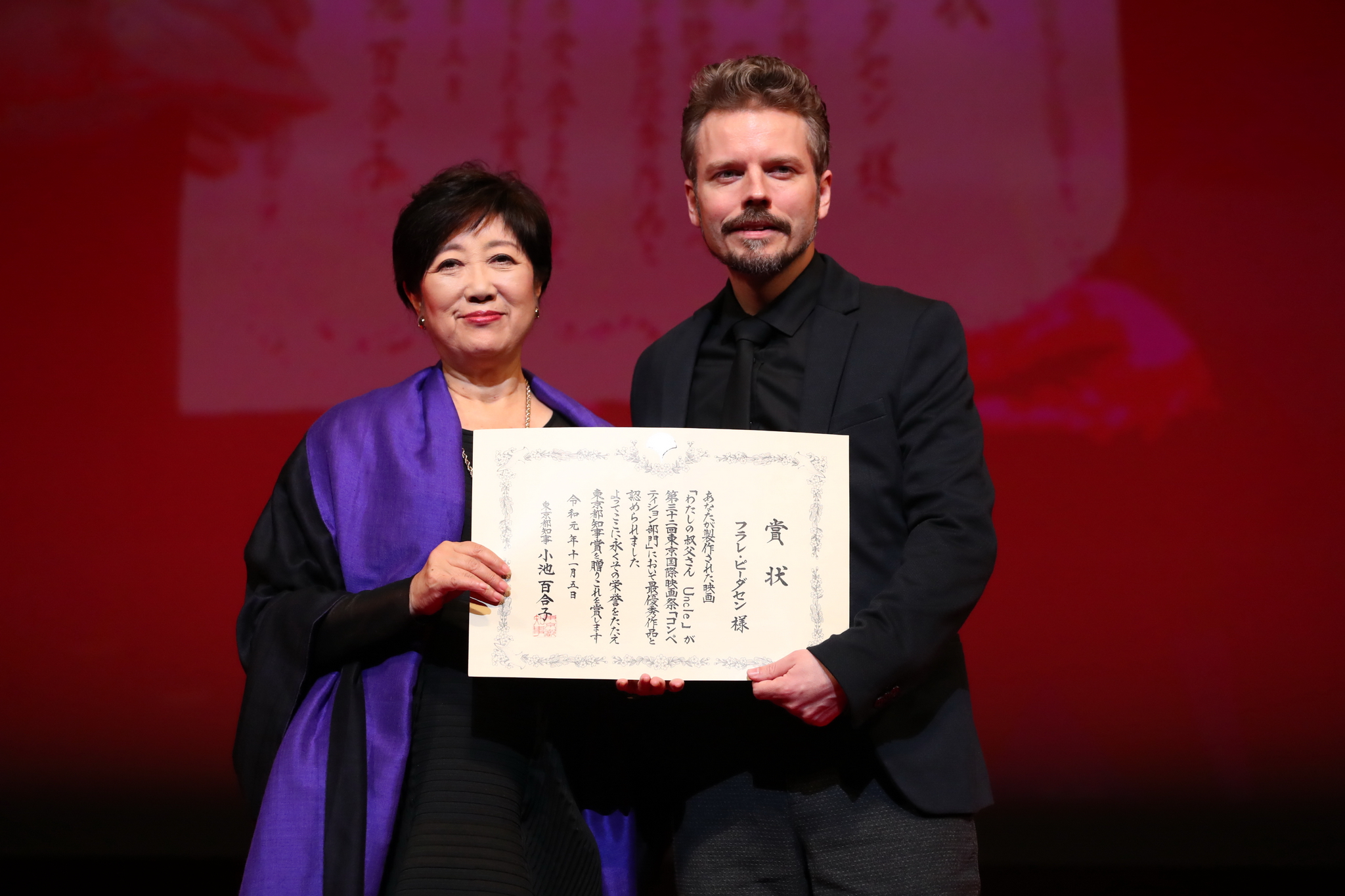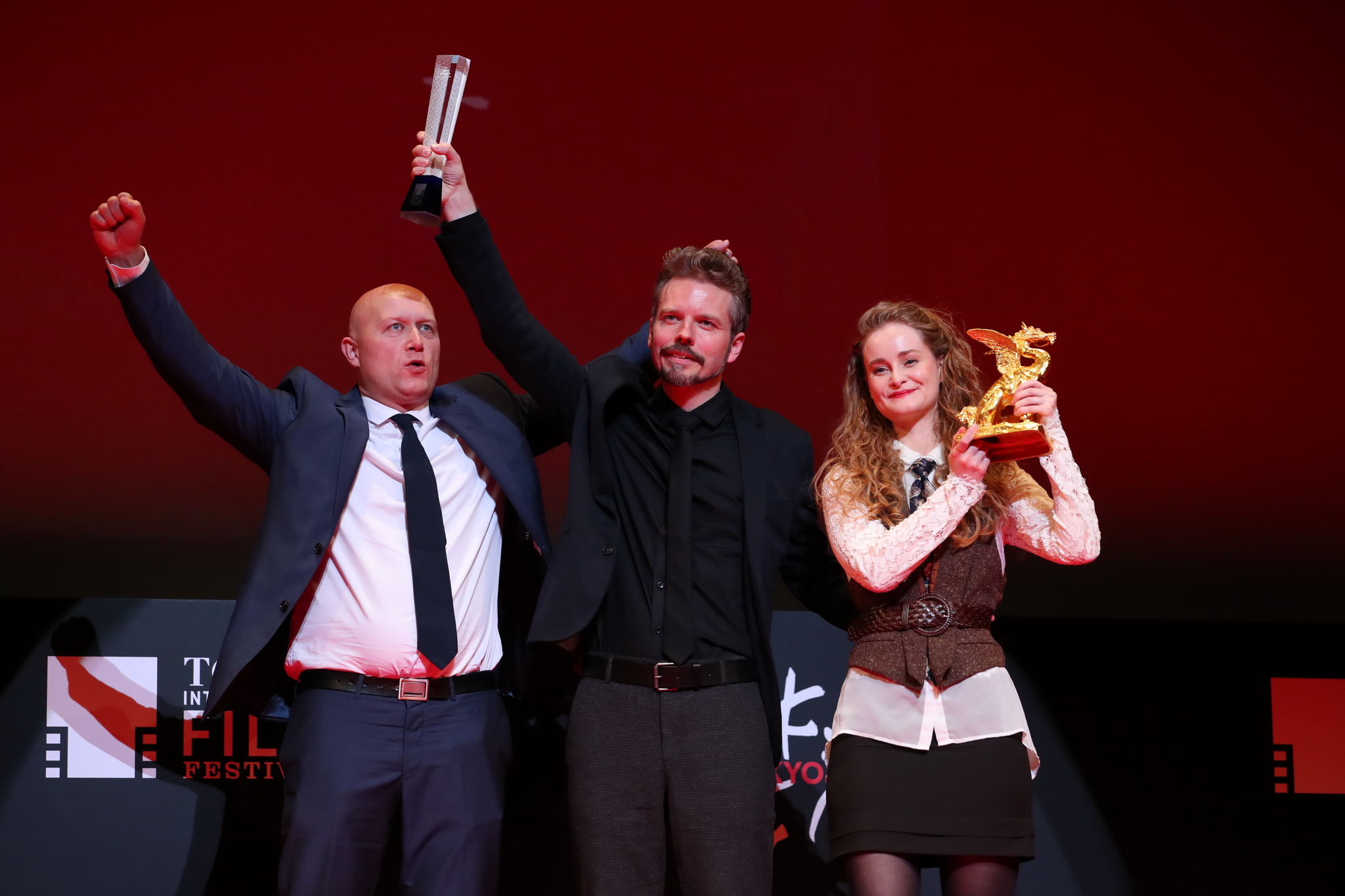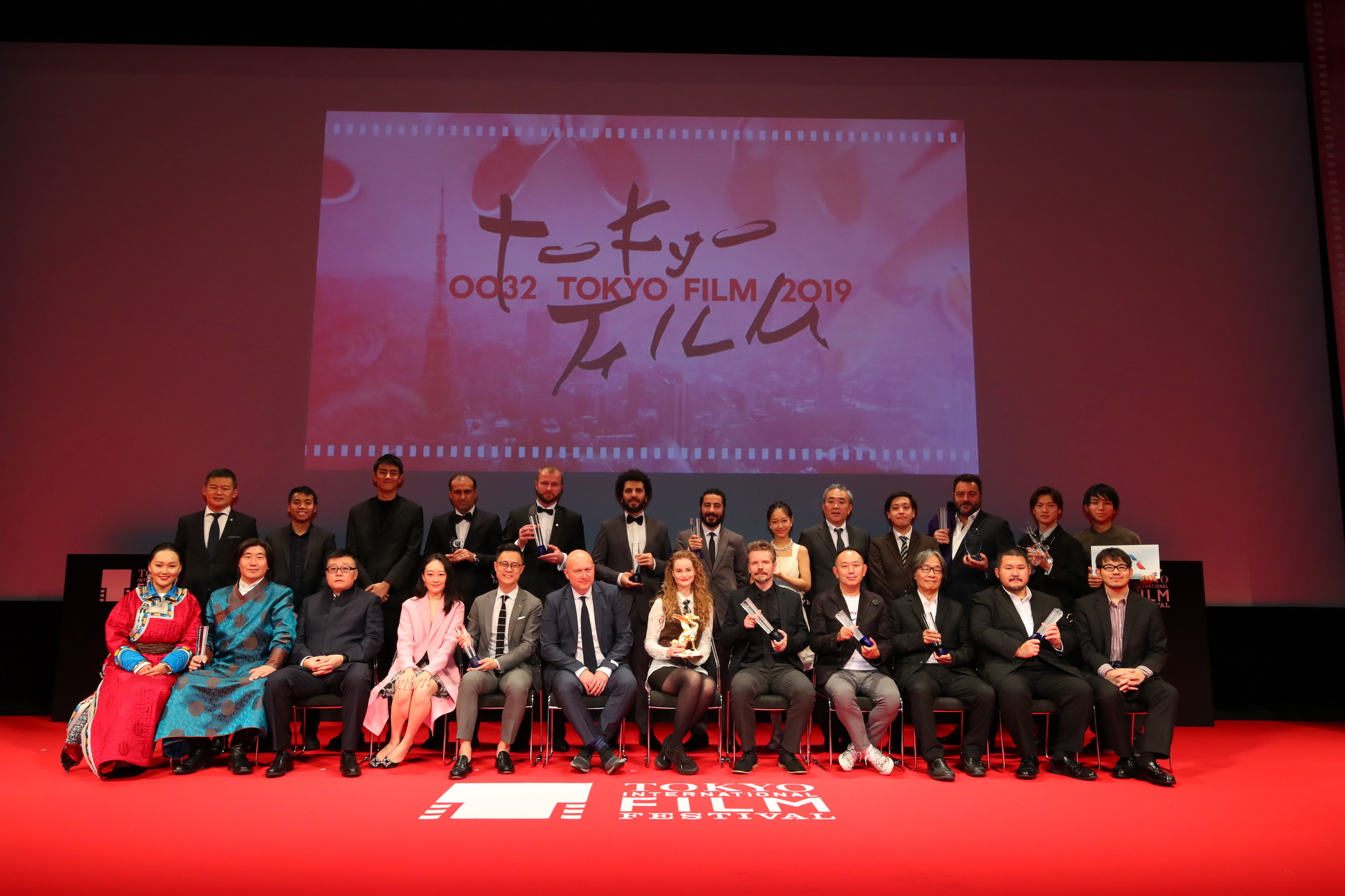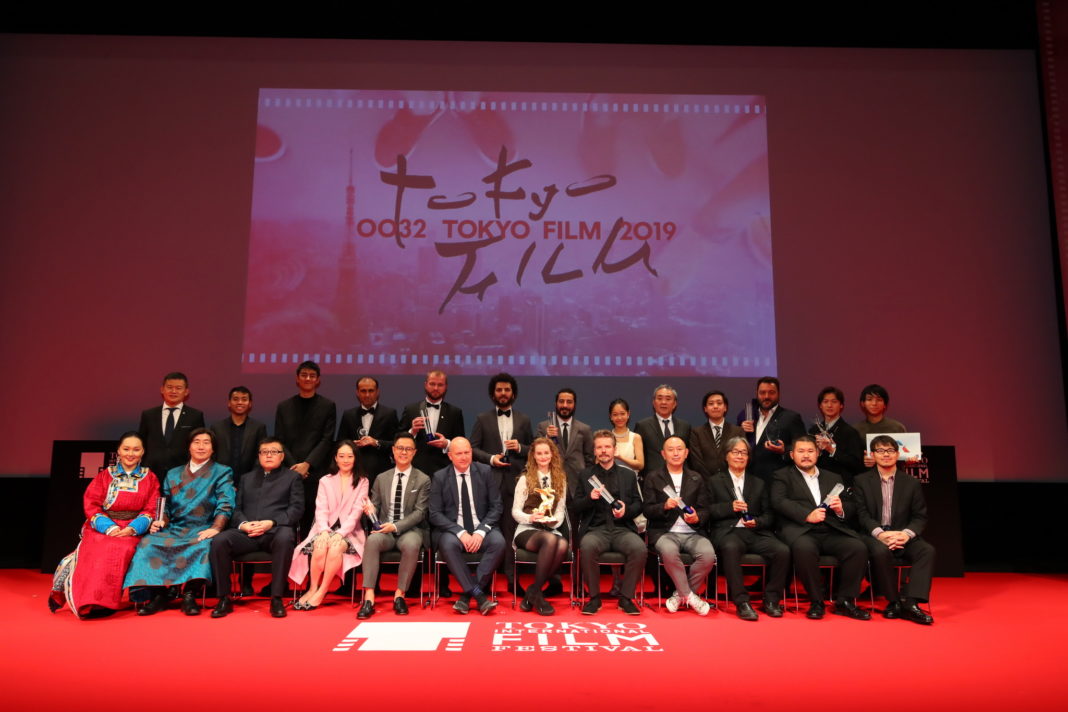The 32nd Tokyo International Film Festival (TIFF) were announced during the Closing Ceremony at the Tokyo International Forum in Yurakucho.
Tokyo Grand Prix, The Governor of Tokyo Award


Special Jury Prize

Tokyo Gemstone Awards are given to promising young actors who have appeared in a film in the festival. Takeo Hisamatsu, the festival director, presented the awards, which went to Riru Yoshina for Take Over Zone, Sairi Ito for Life: Untitled, Yui Sakuma for I Was a Secret Bitch and the Norwegian actress, Josefine Frida, who appeared in the Competition feature Disco.
The Japanese Cinema Splash Awards were up next, honoring the newest independent Japanese films at the festival. Jury member Akiko Ooku mentioned that it had been a very difficult task to select the winners, but that the three jury members were united in their selections.
She presented the best director award in the category to Hirobumi Watanabe for his film Cry. Watanabe, who has participated in TIFF five times before and won the Japanese Cinema Splash Best Film Award for his earlier film Pool Side Man, was quite overcome with emotion. He mentioned that his film company is essentially a family business in Tochigi Prefecture, and especially thanked his grandmother, who appeared in the film and passed away in August at the age of 102. “I won this award because of her,” he said, his voice breaking.

The Best Picture Award went to the film i -Documentary of the Journalist-, which is about controversial Tokyo Shimbun reporter Isoko Mochizuki. Veteran director Tatsuya Mori apologized for “being dressed if I were going to my local rental video parlor,” and thanks the jury and TIFF for selecting the film. Mori talked about how the “air we breathe today in Japan is filled with repression.” Producer Mitsunobu Kawamura, explained how the movie was a companion piece to a fictional drama, The Journalist, based on the same reporter and released to great box office acclaim, earlier this year.
The Asian Future Award, selected by a three-member jury, was given for films that demonstrated “passion and universality,” according to jury member Elena Pollacchi, as well as those that would connect with audiences.
Iranian film Old Men Never Die, by Reza Jamali, was given The Spirit of Asia Award by the Japan Foundation Asia Center, and the Chinese film, Summer Knight, received the Asian Future Best Film Award. Jamali especially thanked two Iranian directors who have been important to him, Abbas Kiarostami and Amir Naderi, the latter of whom was in the audience. Summer Knight director You Xing mentioned that filmmakers are by nature “insecure creatures,” and that the award he received at TIFF gave him greater encouragement to strive even more.
The coveted Audience Award, selected by TIFF audiences, went to the French film Only the Animals. Director Dominik Moll had already left Japan, so it was up to the lead actor, Denis Ménochet, to accept the award. “I’ve never seen an audience so devoted to film that they would wait two hours to talk with filmmakers about a movie,” he said. “I think that the value of film was actually born here in Japan.”
The Best Screenplay Award went to Shin Adachi for his autobiographical film A Beloved Wife. “This is a rare instance of a comedy being selected for a Competition,” he noted in his thanks.
The Award for Best Artistic Contribution went to Wang Rui’s Chinese feature, Chaogtu with Sarula.
Jury member Michael Noer presented the Best Actor Award to Navid Mohammadzadeh in what Noer described as a performance that showed the actor in “full control of losing control,” as a drug lord in the Iranian thriller Just 6.5. Nadia Tereszkiewicz, who appeared in Dominik Moll’s Only the Animals, sent a video message thanking the festival for her Best Actress Award.
The Best Director Award went to Saeed Roustaee for Just 6.5. The Iranian helmer acknowledged what an honor it was to receive an award from the country that produced Akira Kurosawa.
The Special Jury Prize went to the Ukrainian film, Atlantis. Director Valentyn Vasyanovych sent a message saying how honored he was to receive an award from a country “that has experienced war and understands the pain.” The film’s star, Andriy Rymaruk, accepted the award on behalf of the director.
Tokyo Governor Yuriko Koike presented the Tokyo Grand Prix/Governor of Tokyo Award, commenting that films transcend borders and, looking forward to next year’s Tokyo Olympics and Paralympics, pointed out the importance of culture in the quest for international understanding.
The Grand Prix went to the Danish film Uncle. Director Frelle Petersen spoke about his struggles making the film: “We felt we had already won when we found out we were selected to compete in the Tokyo International Film Festival,” he said. “We were hung over the next day, because it was such a great reason for celebrating.”
Jury President Zhang Ziyi closed the ceremony with words of appreciation for the superlative hospitality the jury had received, while Festival Chairman Hiroyasu Ando expressed the festival’s thanks to audiences and the 300+ volunteers who had made the festival such a success.
Following the 32nd Tokyo International Film Festival Closing Ceremony, the International Competition Jury and the festival’s award winners sat down with the press to share their impressions.
The first half of the conference was devoted to the five members of the jury, with acclaimed actress and Jury President Zhang Ziyi making the opening remarks: “We would like to once again thank the Tokyo International Film Festival for bringing us here and giving us this opportunity to watch such superlatives films, as well as the chance to meet each other and spend time together.”
Hollywood producer Bill Gerber said, “We’ve had an amazing experience, both with the festival and with each other. We had a great creative discourse about all the movies and came to what we consider are fair decisions, although we struggled over some of them. And I took some time to get to know Tokyo. Exploring the city with my biking partner, Michael (Noer) has also been a fantastic experience.”
French actor-producer Julie Gayet said, “We get on very well, and share the same feelings. We were very privileged to have a special cinema room just for us, where we could watch the films together on a big screen. The organization is fantastic, very high level, and I want to thank everyone for such a high-class festival.”
Said Danish director Michael Noer, “For me to be part of this jury was a reminder of something I’d actually missed. When I was in film school, I’d go to the cinema 2 or 3 times a day, and have deep discussions with my friends, because we didn’t have a private life. This was one of the only times in my life when I’ve gotten to know people so quickly, and it was a great experience.”
Japanese helmer Ryuichi Hiroki commented, “TIIF is now very close to my heart. Discussing the film we saw with my fellow jurors has helped me realize how deep their passion is for film, and how fruitful it is, meeting all the other people involved in the films.”
Asked what the specific elements were that led to the decision for the Grand Prix selection of Uncle. Zhang answered in English, “It’s very easy to answer your question: It is the best movie. We all agree on that.” As for the other award selections, “The 14 films in competition really represented a wide diversity — not just artistic films, but films like the Japanese comedy A Beloved Wife, as well as artistic films like the French film Only the Animals. The quality of all the films was wonderful, with wonderful performances. We felt it was a very rich selection.”
Zhang was also asked about the jury’s perception of TIFF. “There are 9 members of the jury at Cannes, which I’ve had the privilege of serving on,” she responded, “while TIFF only has 5, so we didn’t have to bicker as much as we did at Cannes.”
The panel was asked whether they’d made any discoveries during their time in Tokyo. Gerber, who joked about discovering that there’s great pizza, said, “We felt the level of filmmaking was extraordinary. Every film had some incredible element, whether it was acting, producing or directing. I’ve made some notes about some of them for the future.”
Said Noer, “I think Uncle itself is a discovery. It was a world premiere and we got to unwrap this gift. Even though it’s Danish (as is he), I didn’t even know about it myself. Also, the young actress in Only the Animals (Best Actress Award winner Nadia Tereszkiewicz), although she was on screen for a short time, really felt like a discovery.”
Added Gayet, “I was very surprised to see that all these films that are quite difficult to see, from Ukraine, for example — tonight there was no Ukrainian interpreter for the winner, because it’s so rare — and a film shot in Inner Mongolia. Now that I’m a producer and distributor, I feel that there are some that I really want to buy and bring to France.” She also mentioned the experience of seeing Shibuya on Halloween, and the World Cup Rugby final on TV.
Hiroki agreed. “It was such a great opportunity to see films from Iran, from Denmark, from Ukraine, and I thought each and every film were really inspirational to me as a filmmaker.”
Concluding the session with the jury, Zhang commented, “Being at TIFF, I think what is most important for the festival is what kind of character, what kind of DNA, what perspective it has. I hope that TIFF will succeed to realize its distinct color in the film festival world.”
The Award winners were then invited onto the stage during the second half of the press conference.
The Japanese Cinema Splash Best Film Award had gone to the hard-hitting i -Documentary of the Journalist-, directed by veteran documentarian Tatsuya Mori, who told the Closing Ceremony audience that he was grateful for the jury’s decision to award the film, despite its controversial political content. Mori was unable to attend the conference, but the film’s star, crusading journalist Isoko Mochizuki, and producer Mitsunobu Kawamura appeared in his stead.
Kawamura, who also produced a fiction film earlier this year that was inspired by Mochizuki, The Journalist, explained, “It’s a fact that not many politically themed films have been made in Japan over the past 20 years, and that was the impetus for us in making this documentary. I produced the fiction film and Mr. Mori was making the documentary at the same time. We were compelled to make this film because the political scene isn’t being well covered in Japan.
Japanese Cinema Splash Best Director Award had gone to TIFF favorite Hirobumi Watanabe, whose autobiographical “man and pig” story Cry marked his 5th outing in the section. Watanabe commented, “We are such a small production company, and we self-fund our tiny films. We don’t make commercial films, and it’s wonderful to have film festivals select films like this. If we hadn’t been found by TIFF, we wouldn’t have found our audience and I’m so grateful. I know there are a lot of young filmmakers putting their hearts and souls into their films, and I hope there will be opportunities for them to be found, as well.”
The Spirit of Asia Award by the Japan Foundation Asia Center had gone to Reza Jamali’s directorial debut, the dark dramedy Old Men Never Die, about a village in Azerbaijan where no one has died for 45 years. The Iranian director said, “I’m so happy to have received this award. I’ve just finished shooting my second film, and to be given the wonderful opportunity to be acknowledged in this way has given me faith in my own (style) to go forward in the future.”
Summer Knight, You Xing’s youth drama about a boy’s summer staying with his grandparents, a directorial debut, had received the Asian Future Best Film Award. He commented, “This award is helping me in terms of my future endeavors. Because this is work in progress, since we haven’t finished the sound mix and color grading yet, this has given me a sense of confidence (about my filmmaking).”
He elaborated, “It’s an autobiographical piece based on my upbringing as a kid in China, but my job as a filmmaker is to convey a story, to convey emotion, to invoke a sense of connection with the audience. But I chose this period (of time) because I’m more familiar with the material, rather than how much it meant to me personally.”
The Best Screenplay Award had gone to Japanese director Shin Adachi’s sophomore film A Beloved Wife, an autobiographical comedy about an unsuccessful screenwriter and his long-suffering spouse. Adachi was asked about his selection of end credits tune, which is the same one sung in the TIFF Opening Film, Tora-san, Wish You Were Here. He said, “It’s one of my favorite songs, and I did know that it was used in the very first Tora-san film. I don’t necessarily want my film to become a series, but I wanted a song that could be sung by a parent and child, so I used it.” He also said that he wished he had thanked his wife onstage during the ceremony, since “For the past 20 years, all her yelling and complaints made their way into my script, for which I’m very thankful.”
Veteran Chinese helmer Wang Rui, whose Chaogtu with Sarula, a gorgeously-lensed tale of a loving couple living in the Mongolian grasslands as they cope with the lures of the city, took home TIFF’s Award for Best Artistic Contribution. Rui said, “What I wanted most to convey with my film was this sense of the husband wanting to leave the grassland to go to the city. The audience might wonder why he would want to leave such a beautiful place, but I wanted to convey that it’s spiritual, rather than physical richness, that he’s looking
he Special Jury Prize had gone to Ukrainian director Valentyn Vasyanovych for Atlantis, a near-future tale of war behind the Ukraine and Russia that seems torn from the headlines. On his behalf, the film’s star, Andriy Rymaruk, commented, “The director and I are so thankful for this film to win such an important award. It was extremely challenging during the production of the film because there’s an ongoing war where we live, and I also work as a soldier. I would like to continue acting in films, but there’s this other side, where I also have to be a soldier. I would love to come back to TIFF and win the Best Actor Award.”

Iranian helmer Saeed Roustaee, who had won the Award for Best Director for his Just 6.5, an up-to-the-minute police officer about the drug trade in his country, took the stage with Best Actor Award winner Navid Mohammadzadeh, the star of the film.



